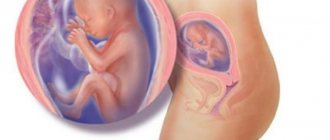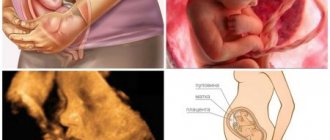Very active movements at 38 weeks.
A few days ago I began to notice that the baby was moving very actively, did not allow me to sit, I could only stand or lie down? Perhaps he simply doesn’t have enough space there, but shouldn’t activity decrease closer to childbirth? I also have severe swelling in my fingers and toes, I can’t even straighten my fingers in the evening?
So I’m thinking, could it be hypoxia? I don’t see the doctor until Thursday, is there any point in going earlier, what if I miss something important? ?
next message Anyutochka92 I was on the site January 9, 2014, 08:29
Something is scaring you here. Yes, well, my baby was very active, she steamed herself. It's OK. Sometimes it would calm down for half a day and I would induce panic, then vice versa. it’s okay, by the way, many people do) DON’T WORRY) I asked the experts myself, they called me an alarmist then)
Ksenia I was on the site February 4, 2014, 15:45 Russia, Moscow
The doctor told me that if the baby is very active, then be sure to report it. A friend’s blood flow was impaired, and the baby had increased activity. It gets active for me when I eat or sleep. Probably when we move around there he rocks to sleep and has a good sleep, but when I go to bed he often likes to be active
I also have very active movements. the heels really sparkle so much)))
Alena I was on the site 3 hours ago Russia, Venev
I didn’t wait as planned, there was also swelling and movements, sometimes strong, sometimes quiet. They did a CTG and said everything was fine. If you are worried, it is better to see a doctor. Why be nervous again? On the contrary, you need to tune in to the good things.
. Dashulya. I was on the site July 18, 2014, 01:23 Russia, Barnaul
The doctor told me to do a fetal movement test every day: lie in a position that is comfortable for you 4 times a day for 30 minutes and count the kicks. For example, at 9 am, then at 2 pm, then at 5 pm and at 9 pm. Then put everything together. Normally there should be from 10 to 30 movements. If there are deviations, then you need to check the baby’s heart and blood vessels; he may not have enough air. Something like this. Maybe it will be useful to you))) Think about the positive.
Bopeska I was on the site May 15, 05:27 Kazakhstan, Astana Thank you, I’ll try to calculate it that way. I went to the doctor, but didn’t get a CTG, it was closed. But they listened to the heart and said everything was ok, it’s just that it’s cramped? I reassured him, since the heartbeat is fine, it means he’s fine there too? pah-pah-pah. Dashulya. I was on the site July 18, 2014, 01:23 Russia, Barnaul
I'm 37 weeks, but according to the ultrasound I'm 39. We already weigh 3500. Also sometimes such riots, it hurts to the point of tears. Our little ones are growing, growing))) Have an easy birth for all of us.
Tatyana I was on the site May 13, 13:00 Russia, Moscow
Last year I was admitted to the maternity hospital with such symptoms at this stage. The trouble is that hypoxia can develop quite quickly. You should do a CTG, it would be calmer!
Daria I was on the site 4 hours ago
I don’t know about active movements, it’s different for everyone. But it’s the same story about swelling. Drink cranberry juice during the day whenever you want to drink (in moderate quantities, of course) and it quenches your thirst and relieves swelling! If you run to the doctor, she will diagnose you without talking (as they wanted me, I swore that I would come to the next appointment without swelling)
Fetal movement: normal
Starting from 28 weeks, the nature of the fetal movements can be used to judge its general condition. The norm for fetal movements is about 10 pushes per hour while the child is awake. If your baby moves frequently, the number of kicks has doubled or more, and your baby is literally dancing in your stomach, you should tell your doctor. This condition may indicate fetal oxygen deficiency (hypoxia).
If motor activity is reduced or the pregnant woman does not feel any movements at all, this is not yet a cause for alarm. Perhaps the baby is just sleeping. Watch him throughout the day and pamper him with a treat. If your baby does not move within 6 hours, contact your doctor. Lack of motor activity may also indicate fetal hypoxia.
In both cases, the doctor will prescribe additional research methods. First of all, this is cardiotocography (CTG).
Why does the baby actively move at 38 weeks of pregnancy?
Starting from the 20th week in primigravidas and from the 16th in multipregnant women, the expectant mother feels the presence of the baby by his movements.
While he is small, he moves almost imperceptibly, gently, swims in his mother’s tummy, constantly changes position, choosing the most comfortable one for himself.
As you gain weight, the space in the uterus becomes less and less, and fetal movements become more noticeable. By the way the baby moves, in what place, with what intensity, attentive mothers can determine with what part of the body he kicked his mother, in what position he is, in what mood.
The intensity of movements is used to assess the child's condition. Modern devices for recording CTG, in addition to recording heart rate, also record the activity of the uterus and the motor activity of the fetus.
In fact, most pregnant women themselves can determine the intensity of the baby’s movements, accurately indicating that they have become more or, on the contrary, less, and will even tell you at what time.
The baby is moving in the stomach - what is the norm to wear?
The most exciting and wonderful day of pregnancy is feeling the first movements of your baby. Already at the beginning of the second trimester, the expectant mother may encounter the fact that the baby is moving in her stomach all day long. This sign is good and means that his nervous system, musculoskeletal system and internal organs are properly formed.
Causes of movements
The activity of the baby is not constant and rhythmic, but depends on various factors.
- Psycho-emotional state of the mother. If a woman is worried, nervous or afraid, then the baby may either temporarily hide or, on the contrary, become overexcited. In any case, during stress, the motor activity of the fetus changes dramatically.
- Physical exercise. The baby may beat in the tummy more often if the mother takes a long walk, goes to the gym or carries heavy weights.
- Diet. Oddly enough, the expectant mother’s menu also affects the baby’s movements. If a pregnant woman is hungry, he may fidget more, literally reminding her that it’s time to eat. Immediately after a snack, the baby also becomes more active. Intense kicks are also observed after a woman eats sweets.
- Ambient sounds. The fetus in the womb is capable of hearing sounds, so it can react to sharp pops, whistles, squeaks and other irritating waves with violent kicks. On the other hand, if the sounds are pleasant (mother's lullaby, classical music, the sound of the surf), then he may calm down and fall asleep.
- Times of Day. It was noted that the child moved a lot in the stomach at night and in the evening.
- Uncomfortable position for mom. If a woman remains in a position that is uncomfortable for the fetus for a long time (lying on her back, bending over, etc.), then she begins to kick quite painfully, forcing her to change her body position.
When to expect movements and what is their norm?
The baby makes its first movements at 7-8 weeks, but the woman does not feel them yet. Starting from 10-11 they become less chaotic and more conscious, and the swallowing reflex develops. Due to its small size, the baby does not yet reach the walls of the uterus, so its activity can only be recorded by an ultrasound machine.
Primiparas may feel kicks starting at 14 weeks. By age 17, the baby may react to bright lights or sharp sounds. Already at 18-29 weeks, he performs conscious movements with his hands: touching his body or the umbilical cord, bending and straightening the phalanges.
Statistics show that most mothers feel the baby only from the 20th week.
With each subsequent pregnancy, tremors are felt earlier, which is associated with a decrease in the elasticity and tone of the uterine walls.
It is also known that slim and athletic women feel the baby moving in their stomach earlier. The smaller the fat barrier between the peritoneum and the wall of the uterus, the earlier the tremors will be felt.
https://www.youtube.com/watch?v=36JQ4LnT21U
The first tremors are felt weakly and appear rarely. Some compare them to “gurgling” in the lower abdomen, others feel stroking or tickling from the inside, and still others confuse them with peristalsis. At 22-24 weeks, the kicks become clear and can be felt by other people who place their palm on the stomach.
The baby should move constantly, except for periods when he sleeps. Scientists and doctors have calculated that already at 20 weeks he makes two hundred movements per day, and by 32 their number reaches six hundred. A woman does not feel all movements. For example, when a child is awake, about 10-12 shocks per hour are felt. During the sleep period (usually 3-4 hours) there is no activity.
What do the movements indicate?
Pushing is a way for a baby to communicate with the outside world and his mother. This is how he demonstrates his mood, complains about his health, lack of nutrients or oxygen.
Fetal hiccups (rhythmic movements in the womb) may indicate hypoxia, for example due to the umbilical cord being entangled around the neck.
Sometimes kicks are a reaction to the voice of a loved one, a beautiful melody, light or the position of the mother’s body.
If movements become rare and sluggish, or too violent and painful, then this indicates the child’s discomfort. You need to consult a doctor to rule out hypoxia and other pathologies.
Already from the 32nd week, the position of the fetus in the womb is determined by motor activity. For example, with a breech presentation, the kicks will be felt in the lower abdomen, causing the bladder to suffer. If the baby beats strongly in the abdomen at the level of the navel, then he has the correct presentation - with the head towards the birth canal.
In order to estimate the frequency of movements, they must be counted using the Pearson method. Starting from the 28th week, from 9 am to 9 pm, count every kick. Note the time when the 10th appears in your diary.
Shortly before birth, movements become less frequent - because the baby is very cramped in the womb. It gradually calms down and descends along with the uterus towards the birth canal.
But a complete lack of physical activity for more than 12 hours is already a reason to make an appointment with a doctor.
A modern mother should be able to feel her child and evaluate the number of his movements. Sometimes frequent or infrequent tremors can indicate formation pathologies and be the first symptom to consult a doctor.
Source: https://beremenyashka.com/rebenok-shevelitsya-v-zhivote.html
Should you pay attention?
Often it is these changes that make it possible to suspect problems in the baby’s condition caused by problems with the feto-placental system. The child lets his mother know that he lacks oxygen and nutrients.
If, in addition to a change in the frequency of movements, their strength changes - each movement causes pain to the mother, a condition such as oligohydramnios can be suspected.
If a pregnant woman is concerned about changes in the baby's behavior, she should consult her doctor.
The simplest and most accessible way to exclude or confirm a condition disorder is to perform a CTG. 30 minutes of continuous recording will be enough to find out whether the child needs help.
What happens to the baby at 38 weeks
In the middle of the last month of pregnancy, the baby is ready for a full-fledged existence outside the womb. His lungs are ripe for breathing and the baby makes breathing and swallowing movements. You can feel him hiccupping. At times the baby sucks his finger, which is sometimes visible during an ultrasound.
The baby's skin is smoothed out, it is covered with vernix lubrication, which is necessary for smooth passage through the birth canal. Some even grew hair on their heads. The baby experiences slight weight gain. Usually by the end of the 38th week he weighs 3 kilograms. His approximate height is 50 centimeters.
The child’s nervous system is also already quite developed. The senses perform their functions well: the baby hears and sees perfectly. He already knows his mother’s voice very well, feels when she is upset, gets scared along with her.
As a rule, mothers in the late stages of pregnancy begin to worry about the fact that the baby is not moving much in the stomach. This is completely normal behavior for a baby at 38 weeks. After all, childbirth is very close. He becomes cramped, there is very little space left in the uterus for only a little activity, and the amount of amniotic fluid decreases.
Usually, by the ninth month, the baby in the uterus takes a head-down position. Which further limits his freedom of movement. This is a preparatory stage for the birth process: the fetal head descends into the pelvis. A woman sometimes feels that she can breathe easier, because the uterus no longer puts so much pressure on the diaphragm.
In some cases, especially for second and subsequent pregnancies, the baby does not take the correct position until contractions occur. The doctor performs an additional ultrasound examination to confirm the position of the fetus. The reason may be a large head size, placenta previa, or the woman’s pelvis is too narrow.
It must be remembered that if fetal movement at 38 weeks does not occur within two hours, then there is a reason to consult a doctor. The baby probably just dozed off, but you should check if everything is okay. To do this, you need to eat something, lie down and watch the child’s activity. As a rule, after receiving a portion of energy, he begins to play. If movement is not felt, an ultrasound examination should be performed to assess the condition of the fetus.
At 38 weeks of pregnancy, your baby is no longer growing as rapidly as before - after all, all his organs and systems are fully formed, and he is absolutely ready for independent life.
At this time, the baby gains no more than thirty grams per day, and accordingly, the mother should not gain much weight. The main reason for weight gain during this period is swelling. Try to eat right, do not eat too sweet and fatty foods, limit yourself to liquids - this way the appearance of edema can be, if not prevented, then significantly reduced.
Quite serious signs that should be immediately treated at the maternity hospital are headache, diarrhea, dizziness, combined with severe swelling and high blood pressure. This is preeclampsia, which is extremely dangerous for both mother and baby. If you notice several of these symptoms, call an ambulance and immediately go to the maternity hospital. If you receive timely assistance, you and your baby will not be in any danger.
A few photos from an ultrasound at 38 weeks of pregnancy will give you a better idea of your baby at this stage.
Just a few months ago it seemed that childbirth was not soon, there was a lot of time before it. But now the 38th week of pregnancy has approached, the pregnant woman needs to prepare for the thought that any day she can become a mother. The expectant mother is now very uncomfortable, it’s hard to walk, it’s hard to breathe.
The baby has already gained good weight, has taken the correct position in the uterus, and the uterus has dropped down.
Mom should already have a bag packed with all the necessary things and documents; it is not recommended to go far from home. The gestation process is at the final stage, the baby is gaining the last grams and is ready to meet his mother.
Women's sensations
With 38 weeks of pregnancy behind us, the woman’s body is intensively preparing for the successful completion of pregnancy. The baby is formed, it is possible for it to exist independently of the mother. Nowadays, many women sometimes notice that the child moves less often. Don’t worry, the fetus has grown at the 38th week of pregnancy; there is simply not enough room for it in your tummy.
Be sure to control the intensity of the tremors; normally there should be 10-15 of them per day. Strong deviations should alert you; if the child is too active or, on the contrary, inactive, it means that he is experiencing discomfort in the womb, this can lead to dangerous consequences. To prevent this from happening, seek advice from a gynecologist.
The woman is now experiencing increasingly unpleasant sensations:
- She gets very tired and needs frequent rest.
- It is difficult for her to breathe; her large uterus puts pressure on her lungs, preventing her from breathing deeply.
- Due to the heavy weight, the legs become very swollen, the woman finds it difficult to walk, and suffers from manifestations of varicose veins.
- Due to her enlarged uterus, she has to visit the toilet frequently, experiences heartburn, and is bothered by belching.
- Many expectant mothers suffer from constipation.
- The skin on the abdomen stretches and dries out, and the woman experiences itching.
- Lumbar pain.
- Insomnia is tormented, usually due to the fact that a woman cannot find a comfortable position. Now the expectant mother is very tense, she is tormented by anxieties and fears.
Some women's stomachs have already dropped; it has become easier for them to breathe, but it is harder for them to walk.
Processes are in full swing in the mother’s body, the purpose of which is to ensure the process of normal childbirth. Hormones that ensured the safety of the fetus are already produced in smaller quantities.
They are replaced by hormones that will cause strong contractions of the uterus during childbirth. The placenta is already aging, this is a normal phenomenon. The baby has enough nutrients, his weight gain is not as significant as before.
The cervix shortens and becomes softer. This is necessary to facilitate the movement of the baby through the birth canal.
We suggest you familiarize yourself with: Cream for stretch marks for pregnant women, review of commercially available brands
All processes taking place in the female body are aimed at ensuring the normal course of childbirth.
Now we are already in the 40th obstetric week of pregnancy, the mammary glands are preparing to feed the child. You can see a thin network of blood vessels on them; the nipples have darkened and increased in size. The production of colostrum begins, the nutrient that the baby will eat for the first 24 hours.
During this period, it is useful to rub the nipples with a rough terry cloth; this will make further feeding easier and prevent the appearance of cracks. A woman’s weight gain is ideally up to 15 kilograms; in reality, unfortunately, it is usually more.
Now body weight is changing at a slower rate, and some reduction is possible.
Fetal development
It's 38 weeks of pregnancy, what's happening to the baby?
The child has a body length of about 50 cm, his weight fluctuates around 3 kilograms. The head has a round shape with a fontanelle, the auricles and nostrils are well defined.
The amount of original lubricant has decreased, it remains only in the folds. The baby has a well-developed subcutaneous fat layer, the skin is dense, pink, and there is almost no fuzz on it.
The nails are well formed, they reach the tips of the fingers, and sometimes they need trimming. The baby is growing hair on his head.
The entire digestive tract of the baby is already prepared for the digestion of milk, the necessary enzymes are secreted. The liver and pancreas are not yet fully developed; this process will continue during the initial years of the baby's life.
The adrenal glands work, they produce adrenaline. The lungs have not yet opened, but the alveoli are already developed. The brain has a respiratory center, it is ready to ensure the baby’s breathing.
The circulatory system is fully developed; at the first breath of the child, the blood circulation will change from intrauterine to independent, extrauterine. The heart beats rhythmically, its contraction frequency is 120-150 beats.
The genital area is developed, the testicles of the male fetus have already descended into the scrotum. In girls, the labia majora cover the labia minora and clitoris. All basic systems and reflexes are ready, the baby is able to move, breathe, and suck.
The baby's head has a circumference of about 35 centimeters. Two fontanelles are visible on it. The length of the first of them is 2.5-3 centimeters, the rear - 0.5 centimeters. The baby's head makes up approximately one quarter of the total height.
Circles with a diameter of approximately 1 cm have formed on the chest around the nipples.
Some pregnant women have noticed a change in the position of their bellies; they are drooping. The timing of this varies from woman to woman; in some women, the uterus may prolapse only just before the onset of labor.
The volume of the abdomen is 90-95 cm, the height of the uterus is 35-38 centimeters. The skin of the abdomen is very stretched and needs special care. A dark stripe has appeared from the navel down, and the navel itself is protruding.
But most of all, a woman worries when her stomach hurts at 38 weeks of pregnancy.
Most likely, your body is already preparing for childbirth if a woman has a strong pull in her lower abdomen. These manifestations accompany the dilatation of the cervix. For some it lasts hours, for others several days. The fetal head is located in the pelvic organs, its pressure brings the uterus into a state of increased tone.
A baby born at 38 weeks will be born healthy and full-term.
The main factors, if present, during pregnancy, pull the lower abdomen:
- Large volume and weight of the uterus, increased amount of fluid in it.
- Severe tension in the ligaments and muscles of the uterus.
- Woman's emotional tension, state of stress and anxiety.
- Excessive physical activity of a woman.
- Poor functioning of the digestive system, constipation.
What should the movement be like in the later stages?
If you are 38 weeks pregnant, the baby is actively moving and making itself known. What could be the reason for this? Before you find out the answer to this question, it’s worth finding out what the baby’s movements should be.
At this stage, the baby may already feel quite cramped in the mother’s tummy. The baby's height is approximately 46-50 centimeters and his weight is about three kilograms. All the baby's movements are more like stroking. The baby stretches the reproductive organ, and the expectant mother may think that the fetus is about to be born. The woman no longer feels sharp shocks, as she did several months ago. All this is absolutely normal.
In the first half of the day, the baby should make up to ten movements. However, too active behavior should alert the expectant mother. In some cases it is normal. Doctors recommend playing it safe and visiting a gynecologist. So, you are 38 weeks pregnant, the baby is actively moving at night - what could be the reason for this?
First fetal movements during pregnancy: timing and sensations
When do they start?
The very first movements of the fetus during pregnancy can be seen at the period when motor activity appears. Unfortunately, women do not feel this. The fetus is so small compared to the uterus that it practically does not come into contact with its walls, and the amniotic fluid surrounding it muffles the baby’s movements.
The time when movements begin during pregnancy is also important for the doctor. From it he can determine the gestational age and the expected date of birth.
By which part of the abdomen a woman most often feels movement, you can find out the position of the baby. If tremors are felt in the upper sections, closer to the diaphragm, the liver, he lies head down. If in the lower abdomen or groin, the baby is most likely in a breech position. It is worth noting that the position of the fetus is not constant and can change up to 36 weeks of pregnancy.
What does it feel like to move?
In most cases, women begin to notice fetal movement during their first pregnancy at 20 weeks. Feelings are different. For some women it feels like a pleasant “bubbling” in the lower abdomen, for others it’s like a slight tickling, while others compare it to the “fluttering of butterflies.”
At the very beginning, it may seem to expectant mothers that the movements of their beloved child are very chaotic and do not obey any laws. But over time, carefully “looking and listening” to their baby, they begin to notice a certain pattern.
Beginning of normal labor
If the expectant mother is already 38 weeks pregnant, the baby is actively moving and pulling in the lower abdomen, this may be a signal that it is worth going to the maternity hospital. Try to relax and not panic. While the contractions are not strong, you can take a shower and take two tablets of the drug “No Shpa”. In some cases, after such manipulation, all symptoms of labor disappear. This suggests that the contractions were training.
The child's activity during this period is explained by the fact that the contracting uterus puts pressure on the baby. It becomes very tight for him and he tries to free himself. Be sure to tell your doctor about this symptom.
If after a short rest and a shower the condition has not changed, then you need to pack your “alarm suitcase” and go to the maternity ward. Most likely, you will return home with the baby in your arms.
Harbingers of childbirth
The body is already completely ready for childbirth. And are you afraid to miss the moment when this very birth begins? Don’t worry, it’s quite difficult to miss your own birth, and the harbingers of labor will help you prepare for it:
- Your stomach drops and it becomes easier for you to breathe.
- There is slight weight loss.
- Discharge from the genital tract is pinkish, streaked with blood, or copious and watery.
- The uterus is constantly in good shape.
- Periodically, the stomach turns to stone.
- Contractions become more frequent and rhythmic.
The appearance of precursors suggests that labor can begin at any time. Now try not to be alone, all things should be completely assembled and packed, and your husband should be in constant readiness to take you to the maternity hospital.
Contractions
Contractions at 38 weeks of pregnancy can be false, but real contractions can also begin. False contractions are not as painful; usually only the stomach hurts. They usually go away when changing position or moving. Also, between two false contractions, a woman may well fall asleep, which will not happen during real contractions.
Real contractions are quite painful, the stomach and lower back hurt, they do not go away with a change in position. In addition, actual contractions become more frequent and rhythmic over time. As soon as your contractions begin, start counting how long they last and what is the interval between them (this will help the doctor determine the expected time of birth), and also call an ambulance - it’s time to go to the maternity hospital.
The following parameters indicate the onset of labor:
- At least 10 contractions per hour lasting from 30 seconds to a minute.
- Contractions are accompanied by increased discharge.
- Your water suddenly broke in large quantities.
If these signs appear, you should urgently go to a medical facility, although the duration of contractions before birth can be up to 10–12 hours.
Oxygen starvation
If you are in the 38th week of pregnancy, the baby is actively moving at night, this may be due to the fact that he lacks oxygen and nutrients. Why does the baby begin to remind himself?
The thing is that the baby receives its main nutrition and oxygen from the placenta through the umbilical cord. When he doesn’t like something, the fetus begins to actively massage and push the baby’s place. This speeds up blood circulation and the embryo receives more oxygen.
When you feel your baby's movements are too active, this is a reason to consult a doctor. You will most likely have a series of tests. Most often this includes blood and urine analysis, cardiotocography and ultrasound diagnostics. The results obtained will indicate the presence or absence of a problem. In some cases, the expectant mother may need an emergency caesarean section.
Incorrect position or tight clothing of a woman
In the later stages of pregnancy, active movement of the baby may indicate that he does not like something. If such sensations occur at night, you should pay attention to how you sleep. Often, expectant mothers lie on their backs and because of this, a large vein is compressed. Blood stagnates in the lower extremities and there is a lack of oxygen. Most women feel all these signs on their own. They begin to feel dizzy and their blood pressure drops. However, in a dream this sign may simply not be noticed.
Tight clothing that compresses the pelvic area also leads to pinched veins and stagnation of blood in the lower extremities. Try to choose loose-fitting items made from natural, “breathable” fabrics that will not cause you discomfort. This is especially true at night. In some cases, even underwear can cause discomfort for the expectant mother.
Placental abruption
If you are 38 weeks pregnant, your baby is actively moving at night or during the day and there is severe pain in the lower abdomen, this may be a sign of premature delivery of the placenta. Most often, this pathology is accompanied by bleeding. However, this is not always the case.
When a child's place is detached, acute oxygen starvation occurs, which doctors most often call hypoxia. In this case, the woman requires emergency surgery. Doctors usually perform an emergency caesarean section. Otherwise, not only the child, but also the expectant mother herself may die.
Stuffy room
When it’s 38 weeks of pregnancy, the baby is actively moving – what could this mean? Perhaps the expectant mother is in a stuffy room. If this process occurs at night, you need to open the windows and allow fresh air to enter the room.
In addition to active movements of the fetus, a sign of a lack of oxygen in the expectant mother may be poor health. In some cases, women even lose consciousness.
View gallery
Changes in the mother's body
Women's sensations
In the ninth month of pregnancy, a woman feels significantly heavier. The uterus has reached its maximum size. Because of this, when lying down, it puts pressure on the main vein and at times you can feel severe dizziness or nausea. Therefore, you should lie on your side more often.
Some expectant mothers have severe back and joint pain. Ankles swell more intensely. Which indicates that labor is approaching.
Body weight most likely will no longer increase, because the production of amniotic fluid in which the baby is located is reduced.
Cutting and stabbing pains in the perineum may be noted: the head descending into the pelvic area exerts strong pressure. Urination becomes more frequent. The discharge becomes more intense and thicker, acquiring a brownish tint.
The baby, as a rule, does not move much at 38 weeks. However, if his head still does not drop, then his activity may not change. At this time, expectant mothers note that their biological rhythms with the baby often do not coincide: during the day the baby sleeps, and when the mother wants to rest, he begins to push her from the inside and spin.
The difference is due to the fact that during the day a woman walks and does something. The uniform rocking of the child calms him down and he falls asleep, and at night, with complete peace, he wakes up and plays with might and main. The baby can also be awakened by infrequent contractions of the uterus, which become more intense as the cherished date approaches and help the cervix soften and, subsequently, open.
In any case, if the fetus moves little or, on the contrary, is too mobile, an examination and consultation with a doctor is needed (the approximate number of fetal movements during this period is 15-20 per hour). There may be some deviations in the normal course of pregnancy. And only a specialist is able to adequately assess the condition of both the mother and her unborn baby.
The 38th week of pregnancy brings a lot of worries. If the baby doesn’t move much, the mother has bad feelings. A special technique has been developed to determine fetal mobility. It is necessary to count the child’s movements at the same time after waking up and before lunch. If there are 10 of them, then everything is fine with him. This test allows you to notice changes in activity in time.
We suggest you read: During pregnancy, urinary incontinence when sneezing
The movement of the fetus at 38 weeks is already a conscious dialogue between the mother and her child. The baby calms down when she gently strokes his belly and talks to him, stops pushing and listens to her voice. You need to enjoy these moments of communication with your child.
The last weeks of pregnancy are the most difficult for the mother: her health does not improve, fatigue accumulates, and the pregnant woman begins to suffer from swelling and frequent false contractions. Often, it seems to the expectant mother that her pregnancy lasts forever and will never end. But the proximity of the long-awaited meeting is encouraging!
Swelling is often a real scourge for mothers. They are associated not only with compression of the ureters and bladder, but also with compression of the inferior vena cava, through which blood flows from the legs. When it is pressed by the uterus, the blood stagnates in the veins of the legs, they swell significantly and hurt. To avoid this, try to lie on your left side more often, stand less, and do not sit in one position for a long time.
Also, due to compression of the bladder by the descending head of the fetus, the mother begins to visit the toilet even more often. Frequent awakenings due to this are aggravated by anxiety before childbirth, so at 38 weeks of pregnancy, insomnia is also a common companion of pregnant women.
Discharge at 38 weeks of pregnancy should be whitish, with a slightly sour odor. Mucus discharge streaked with blood or pink in color is the release of a mucus plug before childbirth.









